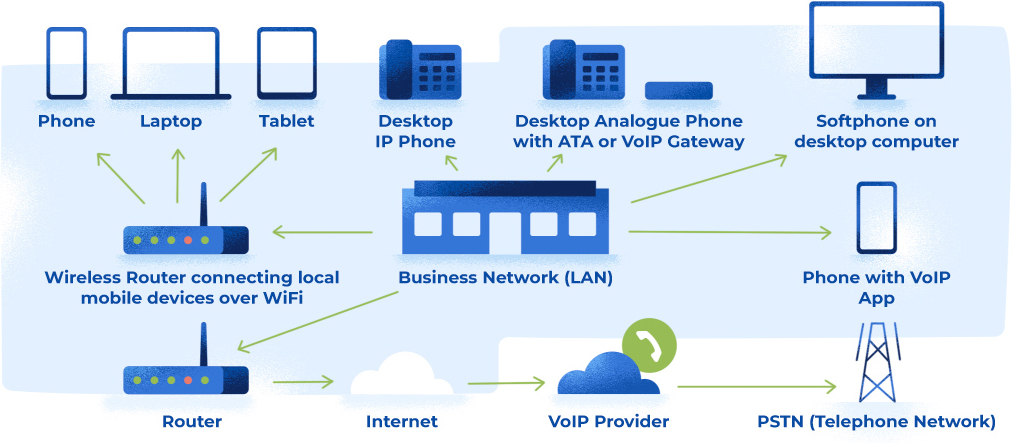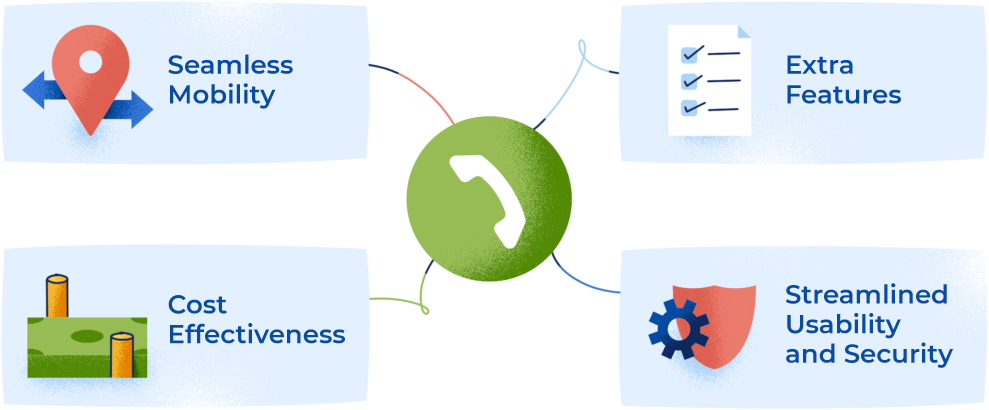VoIP (Voice over Internet Protocol) lets you make and receive phone calls over the internet. In simple terms, it provides phone service over
VoIP can offer a ton of different features that your current telephone service may
Call forwarding to smartphones or desktops, international calls, and other business communications services are easy with VoIP. Most IP telephony services also offer video conferencing, chat, and
What is VoIP (Voice over IP)?
If a traditional telephone uses analog lines and other hardware, VoIP solutions need almost no hardware at all. Analog phones, or “landlines,” are supported by local telephone companies. VoIP providers transmit information digitally through a
Essentially, your phone calls get converted into data that is sent through your
- How Does VoIP Work?
- What Are the Benefits of a VoIP Phone?
- Do I Need a VoIP Phone?
- Can You Use a VoIP Phone at Home?
- Equipment Needed for VoIP
- Is VoIP Reliable?

How Does Voice over IP Work?
One of the core principles of VoIP is that it converts your audio signals into digital signals and phone calls can be established bypassing the telephone company entirely. It’s a great upgrade from an analog phone system or
VoIP transmits data over the internet and sends and receives voice calls when in use. Since VoIP can’t reach any phone on its own, a
A VoIP system doesn’t rely on traditional phone lines — everything is powered and streamlined by a broadband internet connection. With
What Are the Benefits of a VoIP Phone System?
Common misconceptions about cloud phones are poor call quality and that you can only make calls from a computer. Both of these
In the early days of VoIP, the technology had not been fully established and took some time to hit
However, times have changed, and VoIP has become a proven, reliable, and
- Advanced features + flexibility
While VoIP is an excellent option for individuals, enterprise sees the most benefits. Companies can use VoIP phones’ many features to be more productive in theirdaily communications.
Traditional analog lines are suitable for small businesses with a handful of employees, but businesses that regularly makelong-distance calls or have many contacts are better offusing VoIP.
VoIP offers a variety of advanced technology and features that benefit your business. Virtual calling also offers more flexibility and agility in comparison to analog phone systems. Read on to learn about some of a VoIP phone’sstand-out features. - Mobility you can’t beat
With cloud communications, gone are the frustrating days of missing an urgent business call because you were away from your desk. VoIP phones use your existing internet connection, so there is no need for dedicated copper wiring like with atraditional landline.
You’re able to manage your business on the road, tune in to meetings from your mobile device, and never miss a beat. You’re also able to seamlessly transfer a call from your cell phone to your office line without interruptingthe conversation.
The ability to take your office anywhere makes it easier to stay in touch with your customers, employees, and potential clients. As if that weren’t easy enough, most VoIP phones come with a VoIP app that allows you to make calls, send texts, and more usingVoIP technology.
- No need for copper wiring
- Mobile business management
- Call transferring from cell to office
- Availability to use VoIP Apps
complain about. - Affordable + add-ons you can buy
One of the biggest perks of using VoIP instead of analog phone services is that it reduces costs. Many features of a typical VoIP package would cost extra on a landline (of course, this can vary from carrierto carrier).
For instance, unlimited calling and faxing can help you bypass data charges and traditional toll charges for international andlong-distance phone calls. VoIP phones also use only the necessary amount of data during a call, allowing you to save ondata usage.
Included features like auto attendant, IM (instant messaging) and chat, or voicemail to email mean you don’t have to purchase suchfeatures independently.
- Unlimited calling
- Unlimited faxing
- Auto Attendant
- HD Voice Quality
- Unified Communications
- Video Conferencing
- IM & Chat
- Voicemail to Email
- Chat, video, conference calling — all in one
Digital communications make it easier than ever for employees to smoothly connect with each other, clients, and customers from their desktop. You can even forward calls tomobile devices.
Using a VoIP phone, you can share information, ideas, and thoughts inreal-time. You can also expedite projects with instant collaboration tools such as IM, group chats, andvideo sharing.
VoIP phones link to user accounts, not phone numbers so that you can switch between simultaneous calls on anygiven account.
With a traditional landline, you need to sign into several accounts to chat via phone, video, and IM. On the contrary, you can chat seamlessly, share screens, and more with a businessphone service.
These communications can be sent from anyInternet-connected location in the world, allowing you to work onthe go.
- Instant messaging (IM)
- Group chats
- Video sharing
- Conference calling
- Teleconferencing
- Switch between simultaneous calls
- More secure than your landline
Security is one of the biggest worries of business owners — with good reason. Your assets are precious and switching to new technology can make youfeel vulnerable.
Contrary to many beliefs, VoIP is secure and safe. There are several features available with today’s cloud phone systems that aidin security.
For example, many VoIP routers come with advanced security features and dashboards. Ensuring that your network is secure is the first step to a robust cloudphone connection.
The second step is ensuring that you partner with a VoIP provider who values security. This is why it’s essential to have a checklist when looking for a business phoneservice provider.
Good questions to ask include:
- Are they accredited?
- How many data security centers do they have?
- What is their uptime?
- Do they offer system status updates?
- What software do they use?
- Are thy HIPAA compliant?
- Do they prioritize user security?
- What infrastructure do they use?

Do I Need a VoIP Phone?
Even though VoIP is gaining popularity among enterprise clients, many businesses are still sitting on the sidelines wondering if VoIP is right for them. The truth of the matter is VoIP is not right for everyone. However, it will work
There are several factors to consider when deciding whether to transfer to VoIP service. We’ll cover a few of the most important
- Can You Use VoIP at Home?
Individuals can use VoIP, but as we mentioned earlier, businesses will see the most benefit. Companies of all sizes can use VoIP calling — from startups tolarge enterprises.
The main factor to consider is who you communicate with most. For instance, a small business owner who doesn’t make very many long-distance phone calls or video calls may not find that switching to VoIPis necessary.
However, if you make many calls a day, make out-of-city phone calls or would like to make conference or video calls, VoIP is the best option. It also allows businesses to scale their business communications systems. Adding or removing phone lines isa cakewalk! - Setting Up VoIP: Hardware + Software
Many people think that VoIP requires expensive and complicated equipment. This isn’t necessarilythe case!
You’ll need some equipment to take advantage of the services and features VoIP offers, but you can choose to scale up equipment-wise or keep itrelatively simple.
If a user wants only the most basic of features, all they need is a phone, a fast internet connection and the VoIP service itself. Many providers even offer a virtual number service, which allows the user to take calls from theircellular phone.
While the phone, internet, and service itself are the core essentials, additional hardware means the user can take advantage ofmore features.
Additional hardware you may need:
- ATA (Analog Telephone Adapters)
- Headset
- Microphone
- Webcam (or computer with built-in camera)
- IP conference phone
- Online faxes
the softphone.
If your office already has a PBX, you’ll want to leverage SIP Trunking to get the best of VoIP and save on equipment costs. (You can also lower your trunkingcosts, too!)
You may also choose to make calls from your computer using a headset. If you’d like to participate in video calling, a webcam (or computer with abuilt-in camera)is necessary.
If you’d like to make conference calls, you’ll need an IPconference phone.
For those who want to maximize usage (or for large companies), VoIP offers other technology like online faxes, conference phones,and routers.
These features can be extensive and costly, but the option is available for those who wish touse them. - Is VoIP Reliable?
When VoIP services first started, the quality was inconsistent. This meant that calls sometimes dropped, jitter and delays were common, and drop-outs in voice could occur. As Internet bandwidth and service has improved, VoIP call quality has become muchmore consistent.
Today’s technology allows VoIP calls to sound as crisp and clear as a landline phone. However, this will depend on your Internet service provider’s network. The SIP protocol itself allows forerror-correction based on establish IP transport protocols like TCP or UDP. It’syour choice.
You can ensure your network has enough bandwidth using our speed test tool. Once you’ve determined your network is sufficient, you shouldn’t have any problemswith reliability.
Emergency calling
Emergency calling can be a bit of a challenge with VoIP. For instance, if the Internet connection is down, there is no way to make a call using a softphone. For example, during a natural disaster, a cell phone or landline would be necessary to make anemergency call.
Another issue with emergency calling is that — because VoIP uses phone numbers with IP addresses — there is no way to associate a geographic location withthe number.
This means that when you call 911, the operator can’t automatically see your location. In the event of an emergency, you’ll need to be able to tell the operator where tosend help.
Looking to switch to a business VoIP phone service? Datum Consulting can make

